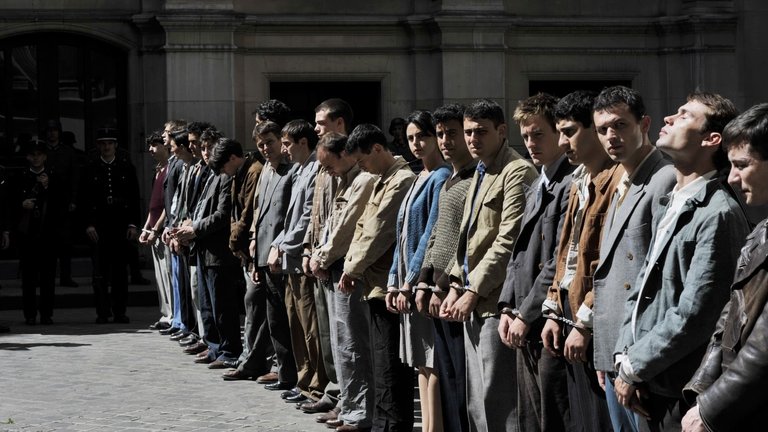
Ancient Latins famously described history as the "teacher of life," suggesting that the past serves as a crucial source of lessons for both the present and future. This perspective resonates deeply with French filmmaker Robert Guédiguian, who, in his 2009 period drama Army of Crime, endeavours to counteract the rising xenophobic and anti-immigrant sentiments prevalent in 21st-century France. By revisiting a poignant episode from World War II, Guédiguian seeks to illuminate the struggles and sacrifices of a diverse group of resistance fighters, thereby drawing parallels to contemporary issues surrounding identity and belonging.
The title Army of Crime refers to a phrase used in the infamous Affiche Rouge, a propaganda poster released in Spring 1944 by the collaborationist Vichy government during the Nazi occupation. This poster identified members of the so-called Manouchian Group as "terrorists" following their arrest, trial, and execution. The implication was clear: these immigrant fighters were portrayed as outsiders with no genuine connection to France, labelled as "foreigners" and "criminals." In an act of defiance, some Resistance members took it upon themselves to alter these posters by adding the phrase "died for France," thereby contesting the collaborationist narrative and asserting their commitment to the nation.
Following this brief introduction to the historical context, Army of Crime unfolds by presenting a diverse ensemble of characters, primarily left-wing activists and committed Communists, who unite in their determination to resist German occupation through acts of sabotage. Under the leadership of Missak Manouchian (played by Simon Abkarian), an Armenian poet driven by personal loss—having lost his parents during the Armenian Genocide—these fighters embark on a perilous journey. Manouchian's motivations are deeply personal; he recognises that his Jewish friends face a similar fate during the Holocaust. Despite his dedication to their cause, he grapples with the moral implications of taking lives, revealing his discomfort with violence. As the group evolves from inexperienced novices to increasingly audacious operatives, they ultimately execute a daring assassination of SS General Julius Richter. This act draws the attention of French colaborationist police, with Inspector Pujol (played by Jean-Pierre Darousin) relentlessly pursuing Manouchian and his comrades.
Army of Crime premiered at the Cannes Film Festival outside of competition and garnered generally positive reviews both domestically and internationally. While much of this acclaim is deserved, it is essential to recognise that the film does not quite reach the heights of memorability nor should it be regarded as a classic within cinematic history.
The film's shortcomings become particularly evident when juxtaposed with Jean-Pierre Melville’s Army of Shadows (1969), which deals with similar subject but with greater finesse. Melville's status as an actual veteran of the French Resistance lends an authenticity to his work that Guédiguian's film—made decades later—struggles to replicate. Furthermore, while Army of Shadows is a work of fiction that allows for creative liberties, Army of Crime is constrained by its commitment to historical accuracy. This obligation sometimes results in a portrayal of Manouchian and his group as heroic martyrs rather than complex individuals shaped by their circumstances.
Nevertheless, Guédiguian's depiction does not shy away from nuance; it acknowledges that Manouchian’s recruits join for various reasons. Many, particularly Jewish members, have little choice but to resist due to imminent persecution. The film captures their initial clumsiness and inexperience while also portraying internal debates about strategy and ethics within their ranks.
More compelling is Guédiguian's broader commentary on French society during this tumultuous period. Rejecting the convenient post-World War II myth that all French citizens actively resisted Nazi occupation, Army of Crime reveals a more uncomfortable truth: many French individuals not only abstained from joining the Resistance out of cowardice but actively collaborated with Nazi forces for reasons ranging from conformity to anti-Semitism. Notably, this collaboration included police which played pivotal roles in tracking down, arresting and even torturing resistance members before handing them over for execution by German authorities. Critics have drawn parallels between this historical reflection and contemporary issues faced by Western societies, particularly during George W. Bush’s presidency when governments endorsed aggressive military actions and controversial practices such as "rendition" or "enhanced interrogation techniques."
Despite its conventional approach, Army of Crime remains accessible to audiences unfamiliar with French history or World War II intricacies. However, deeper nuances within Guédiguian's message may resonate more profoundly with viewers possessing some background knowledge in these areas. Ultimately, while it may not be groundbreaking cinema, Army of Crime serves as an important reminder of how historical events can reflect contemporary societal challenges.
RATING: 6/10 (++)
Blog in Croatian https://draxblog.com
Blog in English https://draxreview.wordpress.com/
InLeo blog https://inleo.io/@drax.leo
Hiveonboard: https://hiveonboard.com?ref=drax
Rising Star game: https://www.risingstargame.com?referrer=drax
1Inch: https://1inch.exchange/#/r/0x83823d8CCB74F828148258BB4457642124b1328e
BTC donations: 1EWxiMiP6iiG9rger3NuUSd6HByaxQWafG
ETH donations: 0xB305F144323b99e6f8b1d66f5D7DE78B498C32A7
BCH donations: qpvxw0jax79lhmvlgcldkzpqanf03r9cjv8y6gtmk9